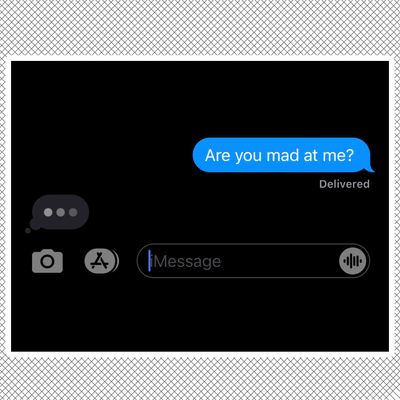
I can count on one hand the number of times I’ve been in the physical presence of friends since March: the distanced dog walk in May; outdoor drinks in June; the contactless meeting of a new baby in August. Each of these interactions has felt both precious and precarious — we aren’t sure when we’ll see each other again, and we say goodbye without hugging anyway, because that’s the rule.
Until we can hang out in person again (whenever that may be), we text, we comment on each other’s Instagram posts, and we wonder — with increasing frequency — whether our friends are mad at us.
Friendship paranoia happens in even the best circumstances. Now, under the worst circumstances, this anxiety has gained new — almost desperate — urgency. We’ve collectively endured months of social distancing, during which it has been highly discouraged (if not impossible) to meet up with friends for catch-up drinks or a last-minute movie date. If the vibe with a friend seemed off over text, there was (and still is) little you could do about it except text more — or wait and hope you’re wrong. Sure, you could call them. But for the most part, you don’t. So you sit at home and fret. And yes, you are me.
Whether we want to admit it or not, many of our friendships are dependent on routine, says Amy Johnson, a communications professor at the University of Oklahoma who has researched long-distance friendships (which so many of ours now effectively are). “With the quarantine, everybody’s routines were immediately changed, and all of our interpersonal relationships were changed as a result,” she says. This shift may be felt most acutely in second- and third-tier friendships, where the bond was primarily a result of circumstance: I miss my weightlifting friends, for instance, but we don’t really exist to each other outside the gym. I have some great work friends, but it was easier to feel close when we actually saw each other in the office. It’s unclear what happens next.
Even close friends are ill-prepared to manage this much uncertainty. While many of us are prepared to have more frank, emotional conversations about our relationships with intimate partners, says Johnson, few are practiced in doing so with friends. “With friends, we might not talk about, like, ‘what’s going to happen now that we’re in quarantine,’” she says. “We’re a lot more used to just kind of letting friendships fade away.”
For some friendships, a quiet, mutual dissolution might make sense — maybe one or two were already approaching their expiration dates — but, obviously, none of us wants our closest friendships to dissolve as a result of the pandemic. With those friends we worry about losing, it may be worth holding a sort of State of the Union, says Johnson: What does each friend want or need from the other right now? How often would you like to talk, and in what form? What would you like to do together once this (whatever “this” is) is over? You wouldn’t be alone if you’d rather have a tooth pulled than have this kind of talk with a friend, but maybe more of us should.
Without this kind of honest confrontation, says Johnson, of course we’re ripe for conflict. “When we’re separate, the uncertainty is higher,” she says. “And when uncertainty is higher, we’re more likely to try to look for those cues that help us interpret what’s going on, so you might take a cue that’s just innocuous and interpret it in a negative way.” This is how you might, for instance, make a friend’s cryptic Instagram story about you, when really they just overcooked their dinner/miss their family/had a tough day trying to be a teacher, parent, and employee all at once. There is also, one can imagine, extra tension between friends with disparate life circumstances right now: parents versus non-parents, those who are still employed versus those who’ve lost jobs, etc.
This is not to say that there aren’t genuine friendship conflicts to be had at the moment. Mahzad Hojjat, a professor of psychology at the University of Massachusetts Dartmouth and author of The Psychology of Friendship, says the time is ripe for friendship fights. (Our friends really are mad at us, maybe!) Given the government’s endless mixed messaging and mishandling of the COVID-19 pandemic, it’s possible some of your friends just don’t see the pandemic the way you do. “People may interpret their friends’ hesitance to meet up as a sign that they don’t care about their friendship, or they may look down on their friends for being ‘too afraid,’” says Hojjat.
Certainly, our collective mental health isn’t helping matters. ““Honestly, everybody right now is at least mildly depressed,” says Hojjat. It’s hard to help a friend who’s depressed, especially if you’re also depressed, and especially if everyone else is too. This is not an easy time to be a friend, and though there is no fixed timeline fir when it might get easier, Hojjat maintains hope that this period of isolation will, eventually, have a positive impact on our social lives. “We know from research that the best way to maintain a friendship is actually to spend time with your friend, to share experiences — go get a cup of coffee, jog together, go watch a movie, have a book club,” she says. “Once this goes away, I think people will opt to meet each other in person, because they’re deprived of it, and whenever you deprive people of something, they crave it even more.”
Before March, I was already a person who said no to plenty of parties and rain-checked numerous coffee dates. I was — and am — a homebody. Though, of course, this is too much even for me. I can’t say for sure whether I will be any different when staying home becomes a choice and not a rule; past experiences with vowed hypotheticals (if X, I’ll always/never do Y again) lead me to believe I’ll perform a brief stint as a social butterfly before reverting to my old habits. But oh how sweet those first months of freedom and friendship will be.





